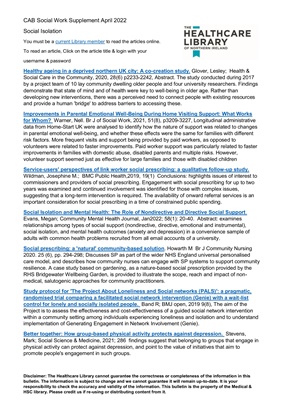
CAB Social Work Supplement April 2022
Social Isolation
You must be a current Library member to read the articles online.
To read an article, Click on the article title & login with your
username & password
Disclaimer: The Healthcare Library cannot guarantee the correctness or completeness of the information in this
bulletin. The information is subject to change and we cannot guarantee it will remain up-to-date. It is your
responsibility to check the accuracy and validity of the information. This bulletin is the property of the Medical &
HSC library. Please credit us if re-using or distributing content from it.
Healthy ageing in a deprived northern UK city: A co-creation study. Glover, Lesley; Health &
Social Care in the Community, 2020, 28(6) p2233-2242, Abstract. The study conducted during 2017
by a project team of 10 lay community dwelling older people and four university researchers. Findings
demonstrate that state of mind and of health were key to well-being in older age. Rather than
developing new interventions, there was a perceived need to connect people with existing resources
and provide a human 'bridge' to address barriers to accessing these.
Improvements in Parental Emotional Well-Being During Home Visiting Support: What Works
for Whom? Warner, Nell. Br J of Social Work, 2021, 51(8), p3209-3227, Longitudinal administrative
data from Home-Start UK were analysed to identify how the nature of support was related to changes
in parental emotional well-being, and whether these effects were the same for families with different
risk factors. More frequent visits and support being provided by paid workers, as opposed to
volunteers were related to faster improvements. Paid worker support was particularly related to faster
improvements in families with domestic abuse, disabled parents and multiple risks. However,
volunteer support seemed just as effective for large families and those with disabled children
Service-users' perspectives of link worker social prescribing: a qualitative follow-up study.
Wildman, Josephine M.; BMC Public Health,2019, 19(1) Conclusions: highlights issues of interest to
commissioners and providers of social prescribing. Engagement with social prescribing for up to two
years was examined and continued involvement was identified for those with complex issues,
suggesting that a long-term intervention is required. The availability of onward referral services is an
important consideration for social prescribing in a time of constrained public spending.
Social Isolation and Mental Health: The Role of Nondirective and Directive Social Support.
Evans, Megan; Community Mental Health Journal, Jan2022; 58(1): 20-40. Abstract: examines
relationships among types of social support (nondirective, directive, emotional and instrumental),
social isolation, and mental health outcomes (anxiety and depression) in a convenience sample of
adults with common health problems recruited from all email accounts of a university.
Social prescribing: a 'natural' community-based solution. Howarth M Br J Community Nursing
2020. 25 (6), pp. 294-298; Discusses SP as part of the wider NHS England universal personalised
care model, and describes how community nurses can engage with SP systems to support community
resilience. A case study based on gardening, as a nature-based social prescription provided by the
RHS Bridgewater Wellbeing Garden, is provided to illustrate the scope, reach and impact of nonmedical,
salutogenic approaches for community practitioners.
Study protocol for 'The Project About Loneliness and Social networks (PALS)': a pragmatic,
randomised trial comparing a facilitated social network intervention (Genie) with a wait-list
control for lonely and socially isolated people. Band R; BMJ open, 2019 9(8), The aim of the
Project is to assess the effectiveness and cost-effectiveness of a guided social network intervention
within a community setting among individuals experiencing loneliness and isolation and to understand
implementation of Generating Engagement in Network Involvement (Genie).
Better together: How group-based physical activity protects against depression. Stevens,
Mark; Social Science & Medicine, 2021; 286 findings suggest that belonging to groups that engage in
physical activity can protect against depression, and point to the value of initiatives that aim to
promote people's engagement in such groups.